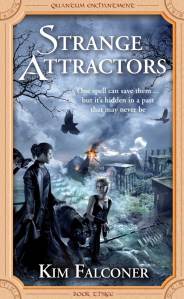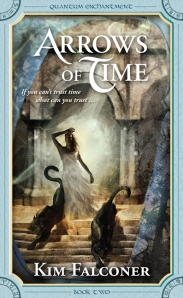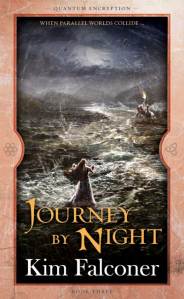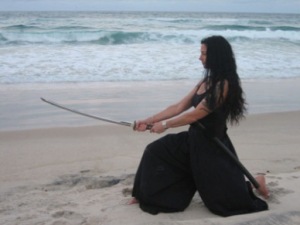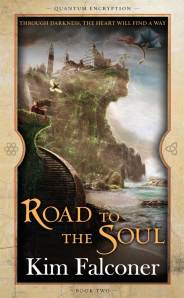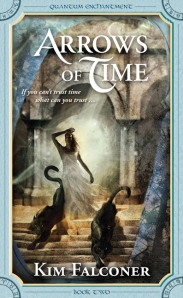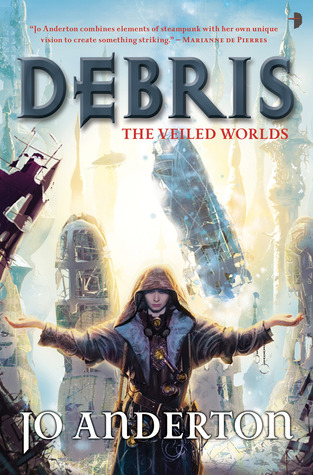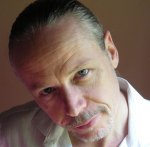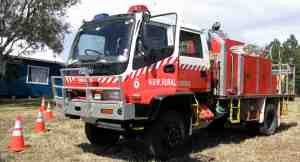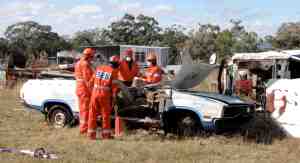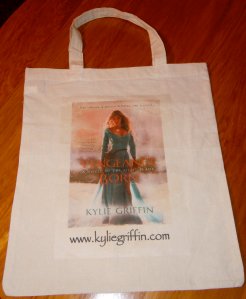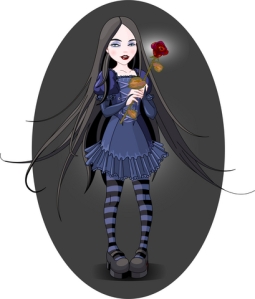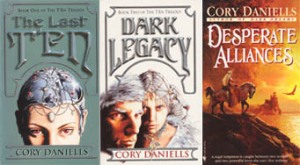As the next of my series featuring fantastic female fantasy authors (see disclaimer) I’ve invited the talented powerhouse Anita Bell to drop by.
Watch out for the give-away question at the end of the interview.
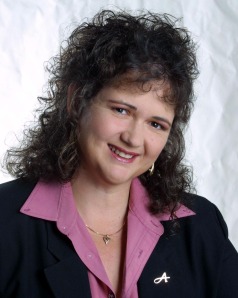 Q: First of all, major congratulations on Diamond Eyes winning the 2011 Hemming Award for Excellence in Science Fiction and Fantasy Themes. Since this is award is not necessarily awarded every year, winning must have come as a wonderful and welcome surprise. Did you consciously set out to explore the themes of race, gender, sexuality, class and disability in the book?
Q: First of all, major congratulations on Diamond Eyes winning the 2011 Hemming Award for Excellence in Science Fiction and Fantasy Themes. Since this is award is not necessarily awarded every year, winning must have come as a wonderful and welcome surprise. Did you consciously set out to explore the themes of race, gender, sexuality, class and disability in the book?
Actually, Diamond Eyes is a story about freedom and independence. But since my main character is a young woman who is blind, sexually inexperienced, and misdiagnosed by nursing staff who all treat her as crazy as well as handicapped, all those other themes grew organically in a way that also resonated strongly and unanimously with the judging panel.
Sad but true; while working for ten years in a mental health facility, I saw young men and women routinely castrated or medicated to suppress their sexual development, often without their knowledge or consent (due to the fact they’d been declared unfit to make such decisions on their own). So this part of Mira’s story is inspired by a young handicapped couple I met, who’d both been disabled through a contagious disease, but eventually regained their independence through modern medications and therapies – and when it came time that they’d recovered enough to have healthy children, it was too late. They’d both been “cared for” in their best interests.
[youtube=http://www.youtube.com/watch?v=LkbKh4hGmSU]
Q: Following on from that, we were part of the QUT Cohort doing a Masters while writing a book. You produced Diamond Eyes. What was the research question you were exploring with this book?
Funny story: It started out as;
How can I crack the big markets overseas and for movies?
But since that was too big a question for a masters and required too many non-existent definitions about degrees of cracking, and how big is big etc, my lecturer dis-engorged the “choke” from my throat and encouraged me to narrow my focus to the more definitive;
How can a novel manuscript be ‘re-visioned’ to create a more satisfying draft.
(Where satisfying is defined by a self-assessed improvement that results in a commercial reward that had previously been unattainable.)
So the dissertation I wrote is called: Revisioning a “Novel Concept”: Beyond vision and revision to advanced editing strategies.
But since a lot of the research is drawn from the film industry, and from mega-best-selling works from overseas, and since a lot of the advanced editing strategies are topics that are never normally discussed in most writing workshops, it might as well be called;
Tips on how to crack the big markets overseas and for movies.
Sound familiar? Hehe.
David Meshow the theme for Diamond Eyes.
[youtube=http://www.youtube.com/watch?v=qERvjhq7tCg&feature=player_embedded]
Q: You have a wonderful book trailer (LOL, my husband did it). The music is by David Meshow. Recently, we were on a panel together where you walked us through the process of finding the musician, approaching him and what has happened since. I’m sure people would find this fascinating, as it’s an example of cross-pollination between creative people.
Wow, yes! We’ve chalked up more views than a lot of big budget Hollywood movies and over 300 Youtube Awards in 17 countries, including;
#1 Most Discussed, worldwide in Feb & March
#2 Top Favourited, worldwide in Feb & March
#2 Top Rated, worldwide in Feb and March
 Normally, I thrive in silence while I’m writing and editing, but at all moments in between I refill my creative energies by filling my home, my car – even my saddlebags with music.
Normally, I thrive in silence while I’m writing and editing, but at all moments in between I refill my creative energies by filling my home, my car – even my saddlebags with music.
Three of my characters love music, and play instruments, so I spent a lot of time on youtube looking for talented amateurs with the same kind of interests. People who could not only play, but play so well, they make it look easy by playing with a relaxed sense of humour. I also looked for people who could play with their eyes closed and invent their own tunes on a wide range of instruments, and that’s how I came across David Meshow – who can do all of that, and resembles Mira’s bodyguard in looks and personality. Best of all, he taught me out how to play electrical instruments outside, around a campfire – so I could make a scene work properly in the sequel Hindsight.
Then after being inspired for so long by David’s music, and his advice during my research stages, I wrote to ask permission to use one of his original instrumental pieces for the book trailer during the launch, because that piece has brilliant moments of violin and xylophone along with all the other instruments that gave it a unique offbeat quality which also dramatically suits the chase scenes at the end of Diamond Eyes, the novel.
But when I mentioned the novel and what it was about, he was so inspired by the unique concept behind Mira’s eyes that he offered to write a piece to suit her specifically.
And that’s what the Original Theme to Diamond Eyes is. Close your eyes, and you can image yourself blind. Open them again and imagine the world around you isn’t today. It looks how things did a century ago, even though you can still feel all the invisible *real* things around you – so if the three story building you’re in wasn’t there back then, well, now you’re standing in mid-air, looking down on the world. Living in two worlds at once. That’s the core idea, and David’s really nailed it with the official theme song. He’s got millions of fans now, but they all seem to agree. Diamond Eyes is the best yet, and I have to agree. But then, I’m biased! Hehe.
Q: I understand there are two more books in the Diamond Eyes series, Leopard Dreaming and Hindsight. When is the last book of the trilogy due out? And what will you do after this?
 Interesting question, because it’s not a traditional trilogy. Diamond Eyes is a stand-alone story set in an asylum, Serenity, which is on a sub-tropical island in Queensland.
Interesting question, because it’s not a traditional trilogy. Diamond Eyes is a stand-alone story set in an asylum, Serenity, which is on a sub-tropical island in Queensland.
Then the duet of sequels; Hindsight (just launched) and Leopard Dreaming (June 2012), are both set on the mainland, during a brand new stage of her life. They’re also much faster paced than Diamond Eyes.
If you liken them to movies in the film industry, then Diamond Eyes would be the pilot, and the next two would be the mini series. So you don’t necessarily need to read Diamond Eyes to enjoy Hindsight, but you’ll definitely need to read Hindsight before taking on Leopard Dreaming in the new year.
Q: In a post on the ROR site you say … ‘SF is not dead – from my perspective it’s morphing/maturing beyond the “pure” genre of science fiction into speculative fiction (the new meaning for SF[1][1]), in a way which offers room for a natural blend of genres which must also complement each other uniquely for each story. Effectively, this permits a wider scope for wider technologies and invites more possibilities and opportunities to cross-dress our genres.’ You go on to say …’ In our own fast-changing world, which is already rife with “fantastic” opportunities and “tomorrow technologies” is it any wonder that such elements are so readily accepted in the environment of a wider story – often even expected – by a market that can still shy away from health food if we label it health food? To many people, it seems that science fiction sounds more like “homework” while fantasy sounds like a “holiday”, and yet how many wouldn’t go anywhere on holiday without their mobile phone, ipod or laptop?’ I love this quote. How near future is the Diamond Eyes series? Would people feel at home in this world?
It’s tomorrow fiction, akin to James Bond, but nowadays, most genres need to be tomorrow fiction to some degree during the writing stages anyway, or else the technology can date the story too quickly and make it seem old fashioned too soon.
e.g.
So I’m constantly inventing new technologies based on my best guesses from existing products and research, and very often those “fantastic” new gizmos are hitting the market by the time the book is.
Off the top of my head, technologies that I invented for my stories in the last ten years, only to have them invented for real by the time the books launched, include;
- Electronic pens, which convert any sketches into a text file or digital image.
- Night Owls, a form of high tech night vision goggles which can also see through buildings using sound waves akin to mobile phone transmissions. Now also used in airports for full body scans.
- NOR:STAN, the National Orbital Reconnaissance: See Through Anything Network. Same principle as nights owls, but also incorporating technology from the mining industry as a larger scale satellite system to help find lost bushwalkers, people trapped in burning buildings, and even terrorists in underground bunkers.
Even Mira’s Hue-dunnits – her electronic sunglasses which can change colour – are now in development as a fashion accessory to suit any wardrobe.
[youtube=http://www.youtube.com/watch?v=eAXBTXnVHns]
 Q: You write in many genres under a number of pen-names, including a set of best-selling non-fiction titles, award winning adventures for children and even wickedly funny romance for women. You’ve always been a writer of exciting stories. What was the first thing you wrote seriously to submit?
Q: You write in many genres under a number of pen-names, including a set of best-selling non-fiction titles, award winning adventures for children and even wickedly funny romance for women. You’ve always been a writer of exciting stories. What was the first thing you wrote seriously to submit?
A cosy crime story, called Budgie Soup, which was published in 5 countries, including the USA’s prestigious Murderous Intent Mystery Magazine, and won the Penguin Award, as part of the Scarlet Stiletto Awards, way back last millennium, in 1999.
Q: You say if you hadn’t been a writer you’d be …’ A cartoonist, vet or research scientist. And as it turns out, writing allows me to do bits of each!’ I can relate to research scientist. I think writers have to have enquiring minds. But cartoonist and vet? Why these two? Are you good at drawing and can you ‘talk to animals’?
Hehe… something like that.
To be a vet, we need to be astute at understanding body language – which works for characters as much as for animals. Pets can’t tell us where they’re hurting, and often characters can’t either. How we treat animals also helps to define us, not only as individuals, but also as a society.
Same goes with cartooning. It’s a social science that’s heavily dependent on observation of the human condition, as individuals, and in society, and how we perceive ourselves through the lens of humour also helps to define us.
To be a vet, we need great compassion, but humour is more often a dark art that can throw masks over fury, injustice and tragedy.
 Q: You seem very comfortable writing a fast paced action thriller and moving across genres. A good book is a good book, no matter what the genre. Do you have any advice for writers to help them improve the pacing of their books?
Q: You seem very comfortable writing a fast paced action thriller and moving across genres. A good book is a good book, no matter what the genre. Do you have any advice for writers to help them improve the pacing of their books?
Short sentences. Listen to men speaking, and compare to women on the same subject. Guys rarely use more than 8 words in a sentence at a time unless they’re explaining something, while women rarely use more than 12.
In action scenes, guys tend to get serious with only 2 to 6 words at a time, while women often clip down to 8 or less.
If you think that’s an exaggeration, watch all your favourite movies with the sound muted and subtitles on – and take notice how clipped conversations can get as the images speed up. Or take a ride on a train or bus with your ipod switched off so you’re listening to other people around you.
Q: You had a friend who attempted suicide when you were younger. You said … ‘From the time we were both 10, we both had to ‘be mum,’ looking after our other brothers and sisters before and after school, and I had to manage my parents’ farm as well when they went away on business. On top of this we went to a high school where extreme pressure existed to be the best we could be. Students came from all over the world because of their high standards and we had to compete against them, too. My friend passed the breaking point.’ Are you tempted to write something that would reach out to teens who feel overwhelmed?
Yes, but not for a while. I can’t write really dark material unless I’m detached from tragedy myself and that’s definitely not this year. Otherwise, writing dark material only tends to take me down further, and once those chemicals in the brain start triggering the downward spiral, it’s a hard cycle to break free from again. And I’d never write that sort of thing without an uplifting ending, because it was soul-destroying misery-lit with downers for endings that drove my friend over the edge all those years ago. Don’t get me wrong, I love a good book that leaves me weepy, but if they’re not tears of hope, love or joy – if they leave me feeling empty and emotionally wretched – I’d never go anywhere near it. If I want to be depressed, I’ll read a newspaper.
Q: I was prompted to start this series of interviews because there seems to be a perception in the US and the UK that fantasy is a bit of a boy’s club. Do you think there’s a difference in the way males and females write fantasy?
Historically yes. Absolutely. But I’d like to think the last 10 years has become a bit more like this:
There’s been plenty of times when I’ve been told by readers that I must have had some of my stories written by my husband. Apparently, I’m not supposed to know how to field strip a Styr or Glock and put it back together again without it blowing up in my face. Or how to turn a gum tree into a signal tower, use scorpions and black light to navigate an underground tunnel, or the horns of the moon to tell north from south in either hemisphere.
At the other end of the scale, I know a subset of male writers who can really get inside a woman’s head well enough to write convincing female characters – but a lot more who can’t.
Q: Following on from that, does the gender of the writer change your expectations when you pick up their book?

Depends on the name they choose to put on the front cover, especially if it’s very feminine or hyper-masculine.
e.g. Stephan King was always going to rule the page once he nailed his genre, and Karen Slaughter was never going to write little kiddies faerie tales.
Then there’s androgynous names, like AA Bell, Sonny Whitelaw, JR Ward etc, where the writing style is far more likely to appeal to both genres. Or at least try to, more often than not.
Q: And here’s the fun question. If you could book a trip on a time machine, where and when would you go, and why?
Ah, but if I told you, I’d create a paradox and a full set of alternative futures in another dimension. Just thinking about it is enough to split the future in two; one in which I do, and one in which I don’t.
Cool timing; there’s a new scientific theory (evolved from string theory, which in turn evolved from studies of nuclear explosions) that our present and past have already been shaped by our future in all its permutations in all dimensions. And that many things about Fate seem inevitable, because they’ve already been tampered with by those who’ve already travelled.
So assuming I’m one of them, and have already made the trip – or “will have going to have made it” at some time in the future (or alternate time line) – you can rest assured that all my friends will have nice things happen to them, while all those who’ve been nasty should be grateful I don’t hold grudges… much.
<insert evil laughter>
Give-away Question:
It’s said that everyone has something they’re naturally or uncannily good at – so good, you might call it a super power. Mira’s gift is seeing the past, her stalker can hear the future, while my own superpowers are merely green lights in heavy traffic and finding the perfect parking space when I most need it. (touch wood!)
So what’s your super power?
Catch up with Anita on Facebook
on GoodReads: www.goodreads.com/aabell










